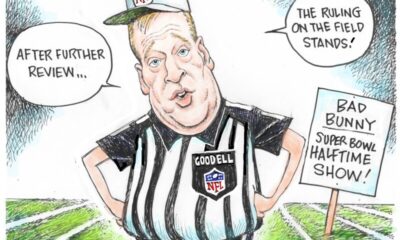Business
Trump Administration Limits Public Service Loan Forgiveness Access

The Trump administration has finalized a rule that restricts eligibility for the Public Service Loan Forgiveness (PSLF) program, affecting thousands of borrowers who serve in government and nonprofit roles. This new regulation will take effect on July 1, 2026, and aims to redefine what constitutes a qualifying employer under the program.
On October 30, the Department of Education announced that employers engaged in what the administration deems “illegal activity” will no longer qualify for PSLF. This decision stems from an executive order signed by President Donald Trump in March, which sought to align the program with the administration’s political views regarding public service.
Changes to Eligibility Criteria
Under the revised rule, the definition of a “qualifying employer” has been narrowed significantly. Previously, any government or nonprofit entity could qualify. The new criteria exclude organizations that have a “substantial illegal purpose,” which the Department of Education defines as activities that support terrorism, assist transgender individuals in transitioning, or work with undocumented immigrants. The department’s fact sheet states that organizations consistently engaging in illegal conduct are not contributing to the public good.
Nicholas Kent, Undersecretary of Education, stated, “The Public Service Loan Forgiveness program was meant to support Americans who dedicate their careers to public service — not to subsidize organizations that violate the law.” Advocacy groups have expressed strong opposition to these changes, asserting that they disproportionately target essential public service workers such as nurses, teachers, and first responders.
Response from Advocacy Groups
Organizations like Democracy Forward and Protect Borrowers have pledged to challenge the administration’s decision in court. In their statement, they described the changes as “a direct and unlawful attack” on public service workers, indicating that they will soon take legal action against the Trump administration.
The Department of Education has indicated that employers will be notified if their eligibility for PSLF is under review due to alleged illegal activities. Employers will have the opportunity to contest these findings and demonstrate compliance with laws. Borrowers will also be informed about their employer’s potential disqualification from PSLF.
The fact sheet explains that if an employer is deemed ineligible, it can reapply to regain qualifying status after ten years or enter a corrective action plan before disqualification to maintain eligibility. Payments made to disqualified employers after July 1, 2026, will not count toward PSLF progress, although past payments will remain valid.
The implications of these changes are significant for borrowers relying on PSLF to alleviate their student debt. As the timeline progresses toward the implementation date, both borrowers and employers will need to navigate the evolving landscape of eligibility and compliance under the newly defined criteria.
-

 Science2 weeks ago
Science2 weeks agoResearchers Challenge 200-Year-Old Physics Principle with Atomic Engines
-

 Entertainment1 week ago
Entertainment1 week agoSyracuse Stage Delivers Lively Adaptation of ‘The 39 Steps’
-

 World2 weeks ago
World2 weeks agoGlobal Military Spending: Air Forces Ranked by Budget and Capability
-

 Politics2 weeks ago
Politics2 weeks agoNHP Foundation Secures Land for 158 Affordable Apartments in Denver
-

 Politics7 days ago
Politics7 days agoNFL Confirms Star-Studded Halftime Show for Super Bowl LVIII
-

 World1 week ago
World1 week agoBoeing’s Aircraft Production: Assessing Numbers and Challenges
-

 Politics6 days ago
Politics6 days agoHamas Chief Stresses Disarmament Tied to Occupation’s End
-

 Lifestyle1 week ago
Lifestyle1 week agoTrump’s Push to Censor National Parks Faces Growing Backlash
-

 Lifestyle1 week ago
Lifestyle1 week agoRed Bluff High School’s Elli Nolan Named Rotary Student of the Month
-

 Health2 weeks ago
Health2 weeks agoNeuroscientist Advocates for Flag Football Until Age 14
-

 Top Stories1 week ago
Top Stories1 week agoUrgent Search for Suspect Who Exposed Himself to Teen Girl
-

 Science1 week ago
Science1 week agoAI Misidentifies Doritos Bag as Gun, Triggers Police Response









